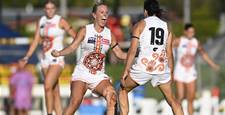A Billabong Pro Junior event in Ballito, South Africa has attracted global attention after a photo of the male and female winners sparked a pay disparity debate.
The female winner, Zoe Steyn, was awarded an oversized cheque with ZAR4000 (AUD$400) printed on it, while Rio Waida, the male winner, had ZAR8000 (AUD$800) on his.
The photo sparked outrage on social with comments like:
Ballito Pro attempted to stop the criticism by saying the World Surf League (WSL), who is the governing body of the event, determines all prize money and they have now brought the pay disparity to their attention.
“The World Surf League (WSL) is the sanctioning body for WSL-aligned surfing events such as The Ballito Pro," they wrote on the Ballito Pro Facebook page.
"The WSL implements certain criteria to determine surf ratings and prize money, and we have formally requested a detailed outline of this process for future discussion.”
The WSL told Hack that men get double the money because there are double the amount of the competitors.
Heres how the ABC explained it: if there are 10 surfers competing for a total pot of $100 in prize money. That works out to a ratio of $10-per-surfer and the winner gets $50, and the runners-up get the rest.
For the female competition, if there is a field of five surfers at the same ratio of $10-per-surfer, the total prize money is $50, the winner gets only $25.
This is what happened at the Ballito Pro. There were 36 male competitors and 18 female competitors, so to keep the money-per-surfer ratio system, it meant Steyn would receive half of what Waida would get.
"Men get double the prize money only because there are double the competitors," WSL Australia/Oceania Regional Manager Will Hayden-Smith told ABC.
"In Australia, the prize money at a junior event is $2,500 for women and $5,000 for men.
"In the men's field we have 64 surfers and in the women's field we have 24," he said.
While the WSL doesn't have plans on scraping the ratio system due to the "demand not being there" for female competitors, they instead charge lower entry fees for women.
"At the QS 6,000 pro surf event in Manly in March, the entry fee for the men was US$250 and for women US$150," Hayden-Smith said.
"This was just because we felt that if we charge the same entry fee that would prohibit women from competing."
Related Articles

Kerr predicted a 'worldie' strike, then scored two for Chelsea

'No-one comes close' to FWA award winner Kerr













